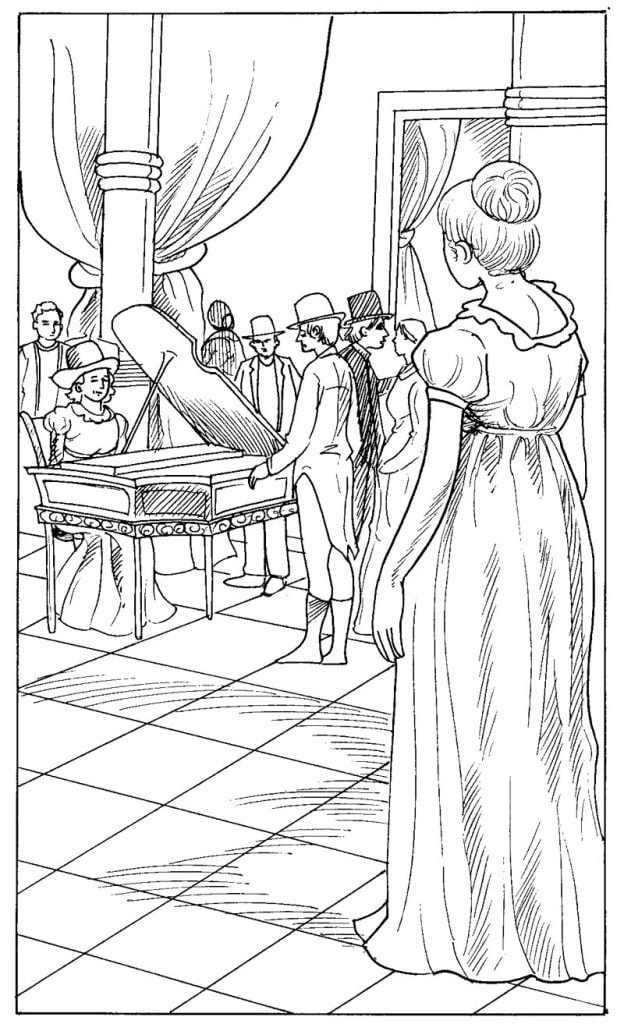Chapter 15
It may be possible to do without dancing entirely. Instances have been known of young people passing many, many months successively, without being at any ball of any description, and no material injury accrue either to body or mind; but when a beginning is made, when the felicities of rapid motion have once been, though slightly, felt—it must be a very heavy set that does not ask for more.
Frank Churchill had danced once at Highbury, and longed to dance again; and the last half-hour of an evening which Mr. Woodhouse was persuaded to spend with his daughter at Randalls, was passed by the two young people in schemes on the subject. Frank’s was the first idea; and his the greatest zeal in pursuing it; for the lady was the best judge of the difficulties, and the most solicitous for accommodation and appearance. But still she had inclination enough for shewing people again how delightfully Mr. Frank Churchill and Miss Woodhouse danced—for doing that in which she need not blush to compare herself with Jane Fairfax—and even for simple dancing itself, without any of the wicked aids of vanity to assist him first in pacing out the room they were in to see what it could be made to hold—and then in taking the dimensions of the other parlour, in the hope of discovering, in spite of all that Mr. Weston could say of their exactly equal size, that it was a little the largest.
His first proposition and request, that the dance begun at Mr. Cole’s should be finished there that the same party should be collected, and the same musician engaged, met with the readiest acquiescence. Mr. Weston entered into the idea with thorough enjoyment, and Mrs. Weston most willingly undertook to play as long as they could wish to dance; and the interesting employment had followed, of reckoning up exactly who there would be, and portioning out the indispensable division of space to every couple.
“You and Miss Smith, and Miss Fairfax, will be three, and the two Miss Coxes five,” had been repeated many times over. “And there will be the two Gilberts, young Cox, my father, and myself, besides Mr. Knightley. Yes, that will be quite enough for pleasure. You and Miss Smith, and Miss Fairfax, will be three, and the two Miss Coxes five; and for five couple there will be plenty of room.”
But soon it came to be on one side.
“But will there be good room for five couples? I really do not think there will.”
“And after all, five couple are not enough to make it worth while to stand up. Five couple are nothing, when one thinks seriously about it. It will not do to invite five couple. It can be allowable only as the thought of the moment.”
One thing only was wanting to make the prospect of the ball completely satisfactory to Emma—its being fixed for a day within the granted term of Frank Churchill’s stay in Surry; for, in spite of Mr. Weston’s confidence, she could not think it so very impossible that the Churchills might not allow their nephew to remain a day beyond his fortnight. But this was not judged feasible. The preparations must take their time, nothing could be properly ready till the third week were entered on, and for a few days they must be planning, proceeding and hoping in uncertainty—at the risk— in her opinion, the great risk, of its being all in vain.

Enscombe, however, was gracious, gracious in fact, if not in word. His wish of staying longer evidently did not please; but it was not opposed. All was safe and prosperous; and as the removal of one solicitude generally makes way for another, Emma, being now certain of her ball, began to adopt as the next vexation Mr. Knightley’s provoking indifference about it. Either because he did not dance himself, or because the plan had been formed without his being consulted, he seemed resolved that it should not interest him, determined against its exciting any present curiosity, or affording him any future amusement. To her voluntary communications Emma could get no more approving reply.
“Very well. If the Westons think it worthwhile to be at all this trouble for a few hours of noisy entertainment, I have nothing to say against it, but that they shall not chuse pleasures for me. Oh! yes, I must be there; I could not refuse; and I will keep as much awake as I can; but I would rather be at home, looking over William Larkins’s week’s account; much rather, I confess. Pleasure in seeing dancing!—not I, indeed—I never look at it. I do not know who does. Fine dancing, I believe, like virtue, must be its own reward. Those who are standing by are usually thinking of something very different.”
This Emma felt was aimed at her; and it made her quite angry. It was not in compliment to Jane Fairfax however that he was so indifferent, or so indignant; he was not guided by her feelings in reprobating the ball, for she enjoyed the thought of it to an extraordinary degree. It made her animated and open-hearted. She voluntarily said, “Oh! Miss Woodhouse, I hope nothing may happen to prevent the ball. What a disappointment it would be! I do look forward to it, I own, with very great pleasure.”
It was not to oblige Jane Fairfax therefore that he would have preferred the society of William Larkins. No! She was more and more convinced that Mrs. Weston was quite mistaken in that surmise. There was a great deal of friendly and of compassionate attachment on his side but no love.
